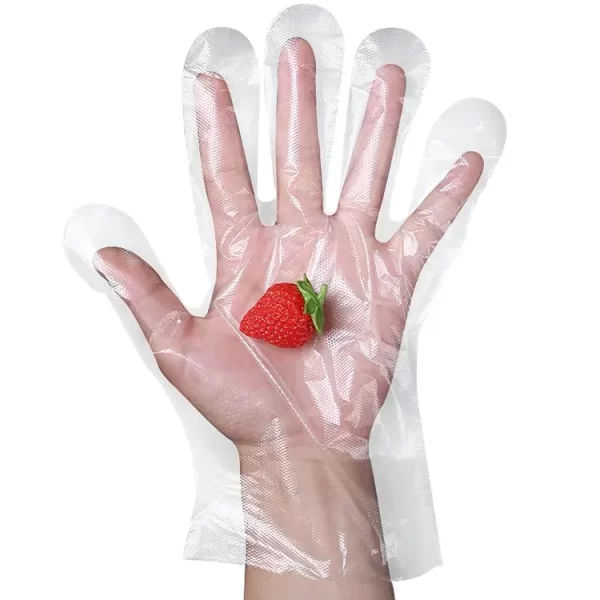Enhancing Food Safety Standards: A Deep Dive into the Impact of Disposable PE Gloves
Introduction
In the high-stakes world of food handling, preparation, and service, safety is the first and foremost concern. Essential tools such as disposable polyethylene (PE) gloves have become a ubiquitous feature in establishments ranging from bustling fast-food restaurants and meticulously detail-oriented gourmet kitchens, to grocery store delicatessens and large-scale food processing factories. But what makes disposable PE gloves so vital to food safety? Let’s take a comprehensive look.
The Utility of Disposable PE Gloves: A Closer Look
At the crux of food safety is the fundamental principle of preventing cross-contamination. Disposable PE gloves, which are standard-issue in most food-related industries, provide a simple, effective, and economical solution to uphold this principle.
Crafted from low-density polyethylene (LDPE), these gloves are both lightweight and robust, creating a dependable barrier between the hands of food handlers and the food they prepare. The material offers a comfortable fit, with enough flexibility to accommodate a range of movements, ensuring that they do not hinder the user’s dexterity. Furthermore, they exhibit a commendable resistance to punctures and tears, providing the durability necessary for various food handling tasks.
An essential advantage of PE gloves is their allergy-friendly composition. As they are latex-free, they eliminate the risk of inducing allergic reactions in users, a common issue with latex-based gloves. With their water and oil-resistant properties, they are an optimal choice for handling a multitude of food items, from fruits and vegetables to meat and seafood, and even oily and greasy foods.
Role of PE Gloves in Enhancing Food Safety
Foodborne illnesses present a considerable global health risk. Through the use of disposable PE gloves, this risk can be significantly curtailed. When food handlers adorn these gloves, the potential transfer of harmful pathogens from their hands to the food they’re handling can be effectively minimized. This seemingly simple act can have a far-reaching impact on overall food safety, reducing the instances of foodborne illnesses.
These gloves are also an essential component of the Hazard Analysis Critical Control Point (HACCP) systems, a proactive strategy that many food businesses employ to ensure food safety. HACCP systems focus on identifying and controlling potential hazards in food production, including those related to personal hygiene. Here, disposable gloves come into play as an effective tool to control physical and biological hazards and adhere to the stringent guidelines of the HACCP system.
Beyond the direct health implications, PE gloves also contribute significantly to preventing financial losses that businesses may incur due to foodborne illnesses. By reducing the risk of disease transmission, these gloves can save businesses the costs associated with food recalls, lawsuits, and damaged reputations.
Disposable PE Gloves: Shaping Consumer Perception and Trust
Beyond their tangible impact on health and safety, disposable PE gloves play a pivotal role in influencing consumer perception. When customers witness food handlers wearing gloves, it reassures them that their food is prepared with a deep concern for safety. This visible commitment to hygiene and safety enhances the trust and reputation of an establishment, ultimately contributing to its success.
In the wake of global health crises such as the COVID-19 pandemic, this reassurance carries even more weight. An emphasis on stringent hygiene and food safety protocols, demonstrated through the use of disposable PE gloves, serves to bolster customer confidence and loyalty. It reassures customers that the establishment is doing everything it can to safeguard their health, leading to a stronger, more trusting relationship.
The Future of Disposable PE Gloves: Sustainability and Innovation
While the benefits of PE gloves are extensive, it’s important to address the elephant in the room – the environmental impact of single-use plastics. As a response to growing environmental concerns, the industry is investing in innovative solutions like biodegradable PE gloves that marry the necessity of food safety with environmental responsibility.
These eco-friendly alternatives, manufactured using sustainable materials and production methods, offer the same functionality as conventional PE gloves while significantly reducing their environmental impact. As the world continues to emphasize the importance of sustainable practices, the adoption of such innovations will be pivotal for businesses aiming to stay ahead of the curve while also maintaining their commitment to food safety.
In Conclusion
As we have explored, disposable PE gloves are a non-negotiable component in the toolkit of food safety. Their use not only offers a practical solution to preventing contamination but also serves as a testament to the value placed on consumer well-being. As we continue to navigate our way in a world that is increasingly focused on health and hygiene, the role of disposable PE gloves will only become more significant.
Ultimately, food safety is not just about following regulations; it is about demonstrating a commitment to customer well-being. It’s a reminder that in the realm of food safety, prevention is always better than cure. By using disposable PE gloves, we can all contribute to creating a safer, healthier food environment for everyone. So let’s glove up and ensure we do our part!
Keywords: Disposable PE Gloves, Food Safety, Cross-contamination, HACCP, Consumer Trust, Foodborne Illness, Food Handling, Biodegradable Gloves, Sustainable Practices, Hygiene, Food Preparation.
Please visit our website for more product details https://medposnonwoven.com/product/disposable-plastic-glove/

